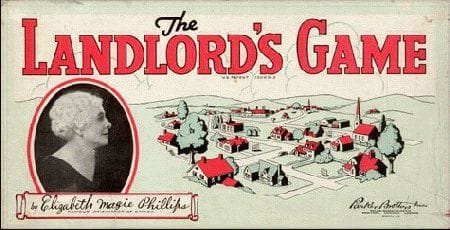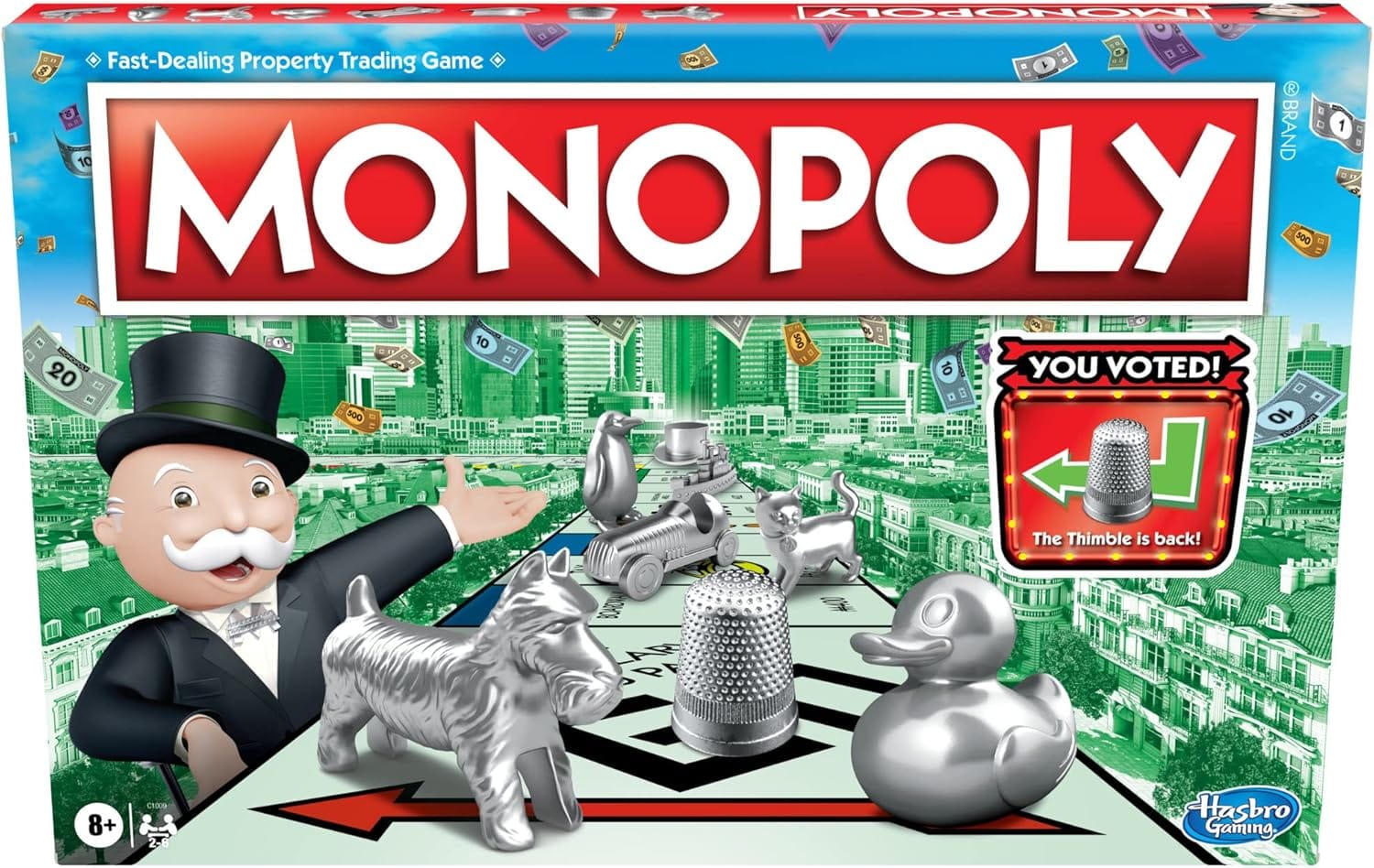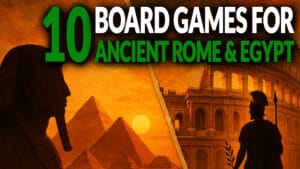The Origins

It’s 1904, and a woman named Elizabeth Magie is staring down the barrel of unchecked capitalism with nothing but a game board and a bold idea. Long before Monopoly had a mascot in a top hat and monocle, there was The Landlord’s Game—a revolutionary little invention created not to entertain budding tycoons, but to expose them.
Elizabeth Magie wasn’t just a game designer; she was a socialist—part of a political movement inspired by economist Henry George, who believed that land should be nationalized or at least taxed so heavily that owning it was pointless. Magie’s goal was to bring her socialist ideas about land ownership and the economy closer to the people.
In 1904, she patented The Landlord’s Game, to commercialize her invention. This patent featured all the familiar DNA: properties circling a board, rent collection, a designated jail space, and the slow spiral into financial ruin if you’re unlucky. But here’s the twist: the game had two sets of rules. One version rewarded monopolization—sound familiar?—while the other promoted a more socialist approach. She wanted players to see the difference. Spoiler alert: the monopoly-driven version was always more popular.
The Landlord’s Game started spreading organically. College students, lefty intellectuals, Quakers, and social reformers all began making their own copies, modifying names and layouts to reflect their local towns. Homemade versions flourished for decades, passed around like a political meme with an ostensibly capitalist punchline.
But with every new homemade board, Elizabeth Magie’s name faded just a little more—until one man came along, copied the whole thing, and got very rich off her vision.
And that brings us to Charles Darrow, who turned that warning into a money-printing machine.
The Birth of Monopoly

Charles Darrow was an unemployed heater salesman, amateur tinkerer, and, depending on who you ask, either a creative genius or the most successful idea thief in board game history.
By the early 1930s, the homemade versions of The Landlord’s Game had morphed into a weird folk tradition. In cities like Atlantic City and Philadelphia, people were hand-drawing boards, naming properties after local streets, and tweaking rules to make the game faster, meaner, and more cutthroat. Darrow wasn’t the inventor of the game—he was a guy who played it at a dinner party and thought, yo, this slaps.
So what did he do? He took one of those local homemade versions—complete with the Atlantic City street names that would become iconic—and he made it prettier. He added visuals, used an oilcloth to draw a cleaner board, and even threw in the now-famous metal tokens. And then, he sold it.
Darrow began producing Monopoly sets himself in 1933, slapping his name on the box as the game’s sole inventor. As the Great Depression dragged on and people clung to fantasies of wealth and domination, Monopoly hit like a dopamine-loaded fever dream. Demand exploded.
Seeing an opportunity, Darrow took “his” creation to Parker Brothers. And guess what? They rejected him. They said the game was too complex, took too long, and lacked originality—ironically, the most truthful critique they could’ve given.
But Darrow wasn’t done. He kept selling the game independently, and by 1934, it was so popular he was raking in thousands—a fortune in Depression-era dollars. Parker Brothers came crawling back, licensing the game and giving Darrow a sweet royalty deal. He became the first millionaire board game designer in history. Not bad for a guy whose big innovation was actually idea stealing.
The best part? Parker Brothers not only bought Monopoly, they also started scrambling to bury the game’s true origins. They would later acquire the rights to The Landlord’s Game from Elizabeth Magie—not to honor her, but to ensure she stayed out of the spotlight.
So, while Darrow was being hailed in newspapers as the American dream personified, the woman who actually designed the blueprint for Monopoly’s success was quietly fading into obscurity.
Legal Battles and Controversies

By the 1970s, Monopoly was more than a game—it was a cultural juggernaut, a rite of passage, a black hole that swallowed Sunday afternoons and family goodwill. But behind the scenes? The glossy illusion was cracking, thanks to one guy who refused to play by the rules: Ralph Anspach.
Anspach was an economics professor, not a lawyer, not a board game designer, and certainly not a corporate rival. But he was a man with a vendetta against monopolistic power, both real and metaphorical. In 1973, during the heyday of big corporations crushing small business, he created Anti-Monopoly—a game designed to flip the script and critique exactly what Monopoly had come to celebrate. Naturally, this did not go over well with the owners of Monopoly’s trademark: General Mills at the time, who had acquired Parker Brothers.
They sued Anspach, hard. The case dragged on for nearly a decade, and it wasn’t just about a board game. It became a full-blown courtroom saga over truth, authorship, and corporate gaslighting.
As part of his defense, Anspach started digging into the origin story of Monopoly—and what he found completely demolished the official narrative. Through old documents, interviews, and dusty patent records, he traced the lineage of Monopoly back to Elizabeth Magie and The Landlord’s Game. He uncovered how the game had been passed around, modified by Quakers and academics, and how Charles Darrow had essentially copied it wholesale from a version making the rounds in Atlantic City.
Anspach’s findings flipped the Monopoly myth on its head. The game wasn’t the brainchild of one down-on-his-luck genius; it was a collaborative, decades-long folk project—created by a woman and co-opted by a corporate machine.
After years of legal wrangling, the courts sided with Anspach in 1979. They ruled that the Monopoly trademark had become generic due to its widespread use before Parker Brothers officially owned it. This cracked open the narrative and legally acknowledged that Parker Brothers didn’t invent Monopoly, they just commodified it.
The implications? Huge. It meant Monopoly’s origin was a corporate fairytale. It meant Elizabeth Magie had been erased for profit. And it meant Ralph Anspach—a guy who just wanted to fight monopolies—had become the ultimate irony: the man who had to sue a Monopoly over Monopoly.
Though Hasbro, which would later acquire Parker Brothers, eventually settled with Anspach and re-secured their trademark, the damage was done. The truth was out. The myth had been shattered. Monopoly, the game, was now a living contradiction: a product of collective protest, sold as a monument to ruthless individualism.
Monopoly Around the World

Fast forward to the modern era, and Monopoly isn’t just a board game anymore—it’s a freakin’ empire. You can barely walk through a toy aisle, browse a Steam sale, or even scroll through pop culture memes without bumping into some version of it. Monopoly today has gone full multiverse: infinite editions, global reach, digital dominance, and cameos in every medium short of a cinematic universe. But don’t count that out either—Hasbro’s probably working on it.
First off, international editions. What started in Atlantic City has now sprawled across the entire globe. You’ve got Monopoly Tokyo, Monopoly Dubai, Monopoly Lagos. The street names get localized, the currencies change, even the cultural references adapt. In France, you might buy Champs-Élysées; in South Africa, it’s Sandton Drive.
Then there are the themed editions. And oh boy, there’s a version for everything. Star Wars Monopoly, Disney Monopoly, Game of Thrones Monopoly (where every player inevitably loses), The Office, Rick and Morty, Fortnite, Stranger Things—hell, there’s even a Bass Fishing Monopoly. It’s reached peak absurdity where the branding often overshadows the gameplay. These versions are less about playing and more about flexing your fandom. You’re not buying Boardwalk; you’re buying Hogwarts.
Digitally, Monopoly’s been ported to almost every platform imaginable. PC, mobile, console—you name it. Online multiplayer, animated boards, voiceover narrators, VR-compatible interfaces. There’s even a Monopoly slot machine. And if you thought rage-quitting during a regular game was bad, try getting booted from a digital match after a three-hour grind because your connection dropped during an auction.
Pop culture hasn’t been immune either. Monopoly’s shown up in The Simpsons, Family Guy, Stranger Things, and more. It’s referenced in books, stand-up routines, political cartoons—you name it. In film, it’s shorthand for greed, corruption, or dysfunctional family game nights. And yes, Hasbro’s been flirting with a Monopoly movie for years. At one point, there were plans for a gritty Monopoly movie directed by Ridley Scott. You heard that right: Ridley “Blade Runner” Scott, turning Mr. Monopoly into the next cinematic antihero. The project never materialized, but the mere fact it was greenlit says everything about Monopoly’s cultural saturation. But there are new rumors about a Monopoly movie by Netflix! We made a video about that as well!
Today, Monopoly isn’t just a game—it’s a global meme, a brand parasite, and a strange mirror to our obsessions with wealth, domination, and nostalgia. It’s become a strange symbol of everything it once tried to critique—and somehow, that irony just makes it more iconic.
But not everyone’s rolling doubles on the nostalgia train. In the final chapter, we’re breaking down why some people still love Monopoly… and why hardcore board game fans absolutely hate it. Spoiler alert: it’s not just because your uncle always cheats.
Cultural Legacy and Criticism

Monopoly. A game that somehow manages to be both the most beloved and the most despised board game on the planet. It’s the “Bohemian Rhapsody” of board games—an iconic hit with mainstream staying power, yet a trigger word in certain elite circles. If you mention it in a hardcore board game forum, be prepared to get virtually tarred and feathered.
So why do so many people still love it?
Let’s start with the obvious: nostalgia. For generations, Monopoly was the board game that lived on the top shelf of grandma’s closet, the one busted out every Thanksgiving between pumpkin pie and political arguments. It’s a cultural artifact at this point—a memory more than a game. Add to that the simple rules—roll dice, move, buy stuff, get rich or go broke—it’s easy to teach and even easier to jump into.
Then there’s the thematic appeal. Monopoly lets you pretend you’re a high-stakes tycoon, building an empire and crushing your enemies. It scratches that primal, power-hungry itch in the most cartoonishly satisfying way.
The social interaction factor is huge. Monopoly forces players to negotiate, plead, manipulate, and sometimes beg their way through trades and deals. It’s like a low-stakes version of Wall Street—plus jokes and passive aggression.
And we can’t ignore the iconic design. From the mustached Mr. Monopoly to the color-coded property cards, it’s instantly recognizable. Even people who’ve never played it know what it looks like.
It’s also accessible. You don’t need fancy pieces, expansions, or deep strategy. You just open the box and play. Combine that with the variety of editions—from The Mandalorian to Millennial Monopoly—and you’ve got something for literally everyone. Whether you love cats, fast food, or BTS, there’s a Monopoly with your name on it.
But here’s where things get spicy.
Ask any serious board gamer, and they’ll tell you: Monopoly is trash-tier. And here is why:
Game length is the first sin. What starts as fun becomes a slow crawl through economic purgatory. Three hours in, and no one’s having fun—just unresolved tension and sore wrists from shuffling paper money.
Luck-driven gameplay is another issue. Dice rolls dictate everything—your movement, your property, your fate. Strategy takes a backseat to randomness, which makes experienced players feel powerless.
And also the player elimination is brutal. You can get knocked out early and just… sit there. Watching everyone else play. For hours. It’s like being forced to stay at a party you’ve already been kicked out of.
Then there’s the runaway leader problem. Once one player gets ahead, it’s game over in slow motion. No real catch-up mechanics. No heroic comebacks. Just a long, painful ride to bankruptcy.
Outdated mechanics make it feel ancient next to modern games with dynamic strategies, resource management, and asymmetric roles. Monopoly is still playing Pong while the rest of the board game world is on Elden Ring.
Then there’s the plague of house rules confusion. Everyone plays Monopoly differently: Free Parking jackpots, double salaries, skipped auctions—none of it’s in the rulebook, but try enforcing the real rules and watch the chaos unfold.
But maybe the greatest irony? Monopoly was designed as a warning about capitalism’s dark side. In its current form, however, most people believe that it is a game that glorifies capitalism. But in reality, Monopoly is neither a socialist dystopia nor a realistic market simulator. Rather, it is a cartoonish caricature.
Whether you love it, hate it, or rage-quit halfway through, Monopoly isn’t just a game. It’s a cultural battleground. And it’s iconic, frustrating, a mess, but still unforgettable.















